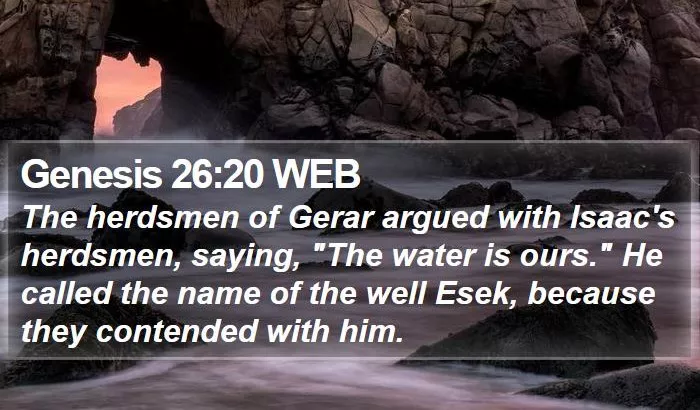Read the Daily Bible Verse – Genesis 26:20 To Strengthen Your Spiritual Journey.
The verse Genesis 26:20 in the King James Version reads:
“And the herdmen of Gerar did strive with Isaac’s herdmen, saying, The water is ours: and he called the name of the well Esek; because they strove with him.”
This passage offers a glimpse into the challenges and persistence involved in Isaac’s journey, highlighting how people respond to opposition and divine provision. This seemingly simple verse can reveal spiritual truths, demonstrating how conflict and perseverance are integral to the journey of faith. We will explore its historical context, biblical interpretation, practical application, and relevance to modern readers.
The Context on Genesis 26:20 KJV
To understand Genesis 26:20, it’s important to consider the broader chapter. Genesis 26 describes Isaac, Abraham’s son, and his experiences in the land of Gerar. The chapter outlines how Isaac received a promise from God similar to the one given to Abraham—that his descendants would become a great nation, and through them, all nations would be blessed (Genesis 26:3-4).
During Isaac’s time in Gerar, he faced multiple disputes with the local people. The Philistines, motivated by envy and conflict, blocked the wells his father, Abraham, had previously dug. These wells were crucial sources of water, especially in the arid land where Isaac and his people were living. In response, Isaac reopened the wells, only to face opposition from the shepherds of Gerar, which brings us to Genesis 26:20. Here, Isaac’s herdmen clash with the herdmen of Gerar over a newly-dug well, highlighting the tension between Isaac’s household and the inhabitants of the land.
The Genesis 26:20 Meaning
This verse contains several important elements that deepen its significance.
1. Strife and Conflict
The verse states that the herdmen of Gerar “did strive” with Isaac’s herdmen, emphasizing the theme of conflict. This conflict symbolizes broader opposition that people often face while pursuing God’s promises.
2. Naming of Esek
Isaac names the well “Esek,” which translates to “contention” or “strife.” Naming the well was more than an act of labeling—it was a declaration of the struggles associated with it. Each well Isaac digs represents both literal and spiritual sustenance, symbolizing the life-sustaining presence of God.
3. Persistence and Humility
Isaac doesn’t confront the herdmen or retaliate, as some might have expected. Instead, he demonstrates a spirit of persistence and humility, moving on to dig new wells. Isaac’s approach to conflict teaches an important lesson about facing opposition without losing sight of one’s calling and purpose.
Genesis 26:20 Application in Life
Genesis 26:20 offers practical applications in both personal and spiritual contexts:
Handling Conflict with Grace
Just as Isaac did not resort to retaliation, we are reminded to approach conflicts with a mindset of humility. Isaac’s patience and peace are qualities that reflect a reliance on God rather than on personal strength or vengeance.
Perseverance in Faith
Isaac’s persistence in digging wells despite opposition serves as an encouragement to persevere in life’s endeavors. The digging of each well represents a new attempt, a renewal of faith even in the face of setbacks.
God as the Source of Sustenance
Just as wells represented essential resources for life in Isaac’s time, believers today are reminded that true spiritual sustenance comes from God, who provides even amidst challenges.
Comparison with Other Biblical Texts
Genesis 26:20 shares thematic connections with other passages in the Bible.
Genesis 13 (Abraham and Lot’s Conflict)
The story of Abraham and Lot’s herdsmen quarreling over land and resources (Genesis 13:7-9) parallels Isaac’s experience. Abraham, like Isaac, chose peace and relinquishment over conflict.
Exodus 17 (Moses and the Waters of Meribah)
In Exodus 17:1-7, the Israelites face a dispute over water in the desert, ultimately calling the place “Meribah,” meaning “quarreling.” Just as Isaac’s well, Esek, reflects contention, the waters of Meribah emphasize humanity’s recurring struggle to trust God’s provision.
Matthew 5:9 (Beatitudes)
Jesus says, “Blessed are the peacemakers, for they shall be called the children of God.” Isaac exemplifies a peacemaking spirit by his actions in Genesis 26:20. His response to conflict aligns with Christ’s teachings on peace and humility.
Modern-Day Relevance
The principles in Genesis 26:20 continue to resonate today. Many people encounter “strife” or “contention” in various aspects of life, whether through relationships, work, or personal endeavors. This verse speaks to individuals who are striving to make a difference in a challenging environment.
For modern readers, Genesis 26:20 highlights that conflicts, even in one’s spiritual journey, should be handled with patience and a peace-seeking spirit. Isaac’s story inspires perseverance, not in a materialistic sense but as a testament to one’s faith and obedience to God.
See Also: Genesis 26:19 Meaning, Context & Commentary
Conclusion
Genesis 26:20 illustrates the significance of humility, peace, and perseverance in the face of conflict. Isaac’s response to the herdmen of Gerar encourages a mindset rooted in faith rather than retaliation. By understanding the historical and spiritual significance of this verse, believers can draw insights that apply to their daily lives. Through Isaac’s example, the passage inspires readers to pursue God’s provision, trusting that the challenges they face will ultimately lead to spiritual growth and fulfillment.
Genesis 26:20 Commentary
Genesis 26:20 is not simply a verse about well-digging; it’s a lesson on handling strife with grace. Various biblical commentators have noted Isaac’s quiet strength and his faith-driven choice to avoid confrontation. Through the act of naming the well “Esek,” Isaac acknowledges the reality of the opposition but ultimately surrenders the well without complaint, relying on God to provide other sources.
Related topics:


